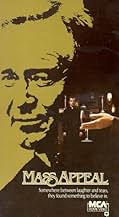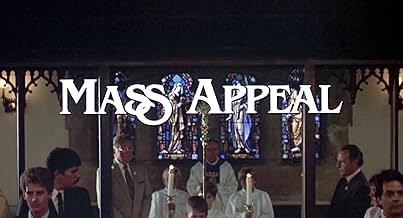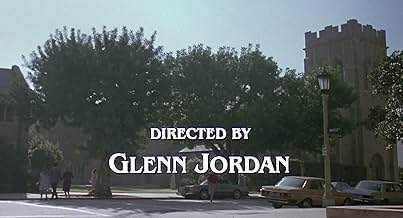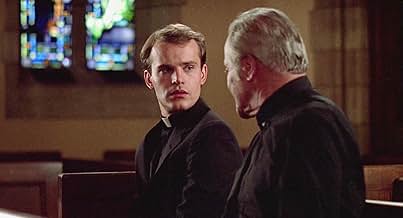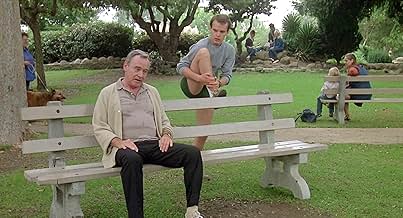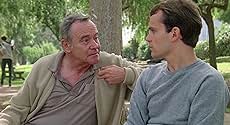IMDb RATING
6.6/10
1.2K
YOUR RATING
A popular Connecticut priest shields a seminary rebel from the wrath of a stern monsignor.A popular Connecticut priest shields a seminary rebel from the wrath of a stern monsignor.A popular Connecticut priest shields a seminary rebel from the wrath of a stern monsignor.
- Awards
- 1 win total
Featured reviews
Mark Dolson (Zeljko Ivanek) wants to be a priest because, as a child, someone boiled his goldfish. The alternate version is as uninspired - because he does not find fulfillment in intimate relationships with either sex, he is qualified for the priesthood. At any rate, he says that he wants `to help people.' A bit of a loose cannon, Dolson is sent by the Monsignor to serve as deacon for the now jaded Father Farley (Jack Lemmon).
What ever his faults may be, Dolson is impassioned. He wants to make a difference. The problem is that it is unclear as to whether the priesthood is the place for him to do it. As a vehicle for exploring the question of gays (or women for that matter) in the Roman Catholic priesthood, Mass Appeal is lacking because of this lack of clarity.
His lack of a clear `call' is foregrounded by his lackluster attempts at sermons. All Mark knows is that he wants to move people. He is uncertain about where his congregation is, or where he wants to move them. Farley steps in to suggest that he go for beloved. Hence the play on words in the title. Farley wants Mark to gain Mass Appeal by making the Mass appealing: if someone finds God in the process, hey that's ok too. Dolson will have none of this and founders.
Farley's appeal is that he knows the system. One gets the impression that he wants someone to rock the boat. Of course the irony of the situation is that in order to shake up the system, one must first join it.
Does this film have a meaning or a message? Well yeah, it does. But that is something for each viewer to figure out for him or herself. It won't make you hate or love the church (any church this one just happens to be Roman Catholic). Did I like the film? Yes. Is it my favorite? No not even close. It is a study of idiosyncrasies and harmless little lies (`I didn't know there was such a thing,' says Dolan). Jack Lemmon is in it for goodness sake, what else could you want?
What ever his faults may be, Dolson is impassioned. He wants to make a difference. The problem is that it is unclear as to whether the priesthood is the place for him to do it. As a vehicle for exploring the question of gays (or women for that matter) in the Roman Catholic priesthood, Mass Appeal is lacking because of this lack of clarity.
His lack of a clear `call' is foregrounded by his lackluster attempts at sermons. All Mark knows is that he wants to move people. He is uncertain about where his congregation is, or where he wants to move them. Farley steps in to suggest that he go for beloved. Hence the play on words in the title. Farley wants Mark to gain Mass Appeal by making the Mass appealing: if someone finds God in the process, hey that's ok too. Dolson will have none of this and founders.
Farley's appeal is that he knows the system. One gets the impression that he wants someone to rock the boat. Of course the irony of the situation is that in order to shake up the system, one must first join it.
Does this film have a meaning or a message? Well yeah, it does. But that is something for each viewer to figure out for him or herself. It won't make you hate or love the church (any church this one just happens to be Roman Catholic). Did I like the film? Yes. Is it my favorite? No not even close. It is a study of idiosyncrasies and harmless little lies (`I didn't know there was such a thing,' says Dolan). Jack Lemmon is in it for goodness sake, what else could you want?
Last night we showed `Mass Appeal' at our parish's monthly Movie Night - REEL Conversations. There was a mixed reaction from the viewers and some lively discussion afterwards.
Some questioned why Hollywood has trouble portraying Catholics (priests, monsignors, laity) in a positive light. We had difficulty coming up with a movie that showed a believer acting like a true believer. In this film, for example, in times of crisis or need, the characters don't turn to prayer for God's help. Seemed odd.
We very much enjoyed the dialog between the mentor priest and young seminarian. It was interesting to see the roles of the two alternate throughout the movie. Plenty of still-pertinent topics they covered (authority of the church, power, homosexuality, celibacy, sin, being lukewarm in one's faith) with some very interesting outcomes.
All in all, an enjoyable film with moments of great humor and warm sentiment. A fine choice for a group discussion. One that challenges your faith and is encouraging to those who believe.
Some questioned why Hollywood has trouble portraying Catholics (priests, monsignors, laity) in a positive light. We had difficulty coming up with a movie that showed a believer acting like a true believer. In this film, for example, in times of crisis or need, the characters don't turn to prayer for God's help. Seemed odd.
We very much enjoyed the dialog between the mentor priest and young seminarian. It was interesting to see the roles of the two alternate throughout the movie. Plenty of still-pertinent topics they covered (authority of the church, power, homosexuality, celibacy, sin, being lukewarm in one's faith) with some very interesting outcomes.
All in all, an enjoyable film with moments of great humor and warm sentiment. A fine choice for a group discussion. One that challenges your faith and is encouraging to those who believe.
"Mass Appeal" is enjoyable on several levels. It works as an examination of the depth of contemporary religious beliefs and their current role in our society, as an indictment of an inflexible system (the Catholic church), and as a comment on the travails of two very different men (ostensibly of the same "cloth") seeking spiritual happiness. Unfortunately, as a "mass appeal" film, not all of the issues are satisfactorily handled, but the film is entertaining nonetheless. Greg Cundiff's excellent review neatly summarizes some key plot issues and holes. For example, I found Ivanek's/Dolson's devotion and desire compelling, but what on earth would make him think that a parish of strangers would listen to his excoriations and then embrace him as their pastor? I agree with Cundiff that the lack of clarity surrounding this fundamental plot point does not help the film. I was also disappointed that Durning's character was unambiguously drawn as the heavy. A more balanced approach may have helped here. Farley's attempt at leading a discussion of the role of women priests is unusually framed, but ultimately leaves the viewer desiring a more compelling resolution to the issue.
Strongly on the plus side, Lemmon is an excellent choice for the lead (whi ch allows him to display his comic and dramatic talents equally). Farley's story is as compelling as Dolson's, and Lemmon squeezes every drop of drama from the script. His final "mass appeal" is quite affecting. Ivanek is intense as Dolson, but Charles Durning's role could be played by anyone. The film is nicely "shot" and has an exhilarating soundtrack at points.
A "7" out of "10."
Strongly on the plus side, Lemmon is an excellent choice for the lead (whi ch allows him to display his comic and dramatic talents equally). Farley's story is as compelling as Dolson's, and Lemmon squeezes every drop of drama from the script. His final "mass appeal" is quite affecting. Ivanek is intense as Dolson, but Charles Durning's role could be played by anyone. The film is nicely "shot" and has an exhilarating soundtrack at points.
A "7" out of "10."
Given all the revelations of sex abuse in the Catholic Church, Mass Appeal in its
own way is as dated as Going My Way in its picture of the Catholic Church and its
inner workings. Still the relationship of Jack Lemmon and Zeljko Ivanek isn't
exactly Bing Crosby and Barry Fitzgerald.
Playwright Bill C. Davis was hired to expand for the screen his two person play which 212 performances on Broadway in the 1981-82 season. It would hardly do to fill 100+ minutes of screen time with two priests just talking. Still the main focus is on popular parish priest Jack Lemmon and Zeljko Ivanek who is quite the oddball rebel at the seminary.
The monsignor in charge of the seminary Charles Durning wants Lemmon to take this kid in hand and explain the facts of life to him otherwise his ambition to be a priest will never be fulfilled. But as these two go back and forth one starts to wonder who is changing who.
On stage it worked to have the forces of repression as Ivanek sees them just be in the abstract. But for the screen Durning's role is critical in that the audience has to have the forces of oppression be personalized. Otherwise it would not have worked.
What the issues are I won't reveal, but as I said the sex abuse scandals have really dated Mass Appeal. Still it's a fine film with great performances from Lemmon, Ivanek, and Durning.
Playwright Bill C. Davis was hired to expand for the screen his two person play which 212 performances on Broadway in the 1981-82 season. It would hardly do to fill 100+ minutes of screen time with two priests just talking. Still the main focus is on popular parish priest Jack Lemmon and Zeljko Ivanek who is quite the oddball rebel at the seminary.
The monsignor in charge of the seminary Charles Durning wants Lemmon to take this kid in hand and explain the facts of life to him otherwise his ambition to be a priest will never be fulfilled. But as these two go back and forth one starts to wonder who is changing who.
On stage it worked to have the forces of repression as Ivanek sees them just be in the abstract. But for the screen Durning's role is critical in that the audience has to have the forces of oppression be personalized. Otherwise it would not have worked.
What the issues are I won't reveal, but as I said the sex abuse scandals have really dated Mass Appeal. Still it's a fine film with great performances from Lemmon, Ivanek, and Durning.
The best part of this movie is the performance by Jack Lemmon as Father Farley, the aging and very comfortable (indeed, far too comfortable) priest of a Roman Catholic parish. Farley is loved by his people - and he loves being loved. He loves the people in return, but more than that - he needs the people; he needs the sense of belonging that he gains from them; the sense of identity he gets from them. He can't bear the thought of losing them, which ironically makes him less effective as their priest. He has a friendly but sometimes strained relationship with the local monsignor (played by Charles Durning) - a relationship pushed to the breaking point when the monsignor assigns a young seminarian, Mark Dolson (Zeljko Ivanec) to Farley's parish as a deacon. The monsignor doesn't like Dolson. He's under suspicion for his too quick defence of two fellow seminarians expelled because it was believed that they were gay. After defending Dolson, Farley is given the responsibility of turning Dolson into a "real" candidate for the priesthood in a month.
I think people misunderstand this movie. It's easy to think that this is about the struggles of being gay and a priest in the Catholic Church. But that's not what this is about at all - at least not to me. This was really about Farley, and his struggles with his own identity - not sexual, but his waning sense of vocation and his desire just to keep people happy and not make waves. His priesthood is being lived out in a cloak of fear that something might go wrong; that his parish might get upset with him; that the monsignor might transfer him. He lacks joy, purpose and fulfilment in his vocation. Lemmon captured that. In a neat trick of camera-work, there was a wonderful shot of Father Farley in the pulpit, in full clerical dress, standing before his congregation - and he looked so small, so vulnerable and even so unimportant. That's what Farley had become.
This was the point of the movie - not Dolson. Dolson pushed Farley. In a strange sort of way, even though he was a pain in Farley's neck, he encouraged Farley; he ultimately enlivened Farley and helped Farley regain that sense of purpose in his vocation as he finally works up the courage to take on the monsignor and make himself vulnerable to his parish by appealing to them to support Dolson. I thought this was very well done.
Durning as the monsignor was also significant. His character pointed out every well the problems of an overly hierarchical and authoritarian ecclesiastical structure. Decisions could get made and people's entire vocations and futures decided at his whim, without any evidence to back up his suspicions. The monsignor was a threatening character; a very dark character which Durning pulled off well.
Keep in mind that this movie is almost 30 years old. It doesn't address any of the current scandals in the Roman Catholic Church because they just weren't out there publicly in 1984. It deals with one priest's failing calling, and one seminarian's attempt to determine if he has a calling. Basically, this was extremely well done on everyone's part. It's one of the better "church" movies I've ever seen. 8/10
I think people misunderstand this movie. It's easy to think that this is about the struggles of being gay and a priest in the Catholic Church. But that's not what this is about at all - at least not to me. This was really about Farley, and his struggles with his own identity - not sexual, but his waning sense of vocation and his desire just to keep people happy and not make waves. His priesthood is being lived out in a cloak of fear that something might go wrong; that his parish might get upset with him; that the monsignor might transfer him. He lacks joy, purpose and fulfilment in his vocation. Lemmon captured that. In a neat trick of camera-work, there was a wonderful shot of Father Farley in the pulpit, in full clerical dress, standing before his congregation - and he looked so small, so vulnerable and even so unimportant. That's what Farley had become.
This was the point of the movie - not Dolson. Dolson pushed Farley. In a strange sort of way, even though he was a pain in Farley's neck, he encouraged Farley; he ultimately enlivened Farley and helped Farley regain that sense of purpose in his vocation as he finally works up the courage to take on the monsignor and make himself vulnerable to his parish by appealing to them to support Dolson. I thought this was very well done.
Durning as the monsignor was also significant. His character pointed out every well the problems of an overly hierarchical and authoritarian ecclesiastical structure. Decisions could get made and people's entire vocations and futures decided at his whim, without any evidence to back up his suspicions. The monsignor was a threatening character; a very dark character which Durning pulled off well.
Keep in mind that this movie is almost 30 years old. It doesn't address any of the current scandals in the Roman Catholic Church because they just weren't out there publicly in 1984. It deals with one priest's failing calling, and one seminarian's attempt to determine if he has a calling. Basically, this was extremely well done on everyone's part. It's one of the better "church" movies I've ever seen. 8/10
Did you know
- TriviaAccording to actor Zeljko Ivanek, the fish sermon scene was shot 15 times from three different angles. Although Ivanek considers the last take the best, most of it didn't make the final cut because it was too emotionally jarring for the audience.
- Quotes
Father Tim Farley: You're a lunatic! And Christ NEEDS lunatics. But the trouble with lunatics is, they don't know how to survive.
- Crazy creditsThis picture is dedicated to the memory of Ray A. Kroc.
- ConnectionsFeatured in At the Movies: Dune/Starman/Mass Appeal/Runaway (1984)
- How long is Mass Appeal?Powered by Alexa
Details
- Release date
- Country of origin
- Language
- Also known as
- Mass Appeal
- Filming locations
- Claremont, California, USA(myself, as I was an extra in this film)
- Production companies
- See more company credits at IMDbPro
Box office
- Budget
- $7,000,000 (estimated)
- Gross US & Canada
- $1,945,658
- Gross worldwide
- $1,945,658
Contribute to this page
Suggest an edit or add missing content



